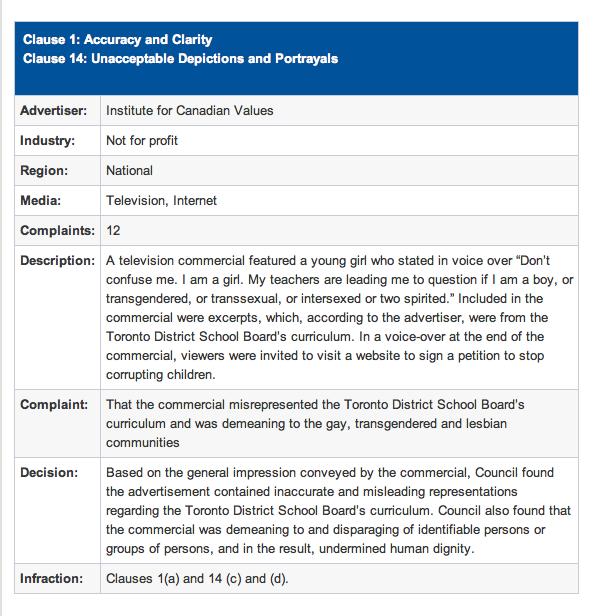UPDATE FEB 19 – Sun Media says it has no knowledge of an Advertising Standards Canada (ASC) decision on a transphobic television ad that ran on Sun News during the provincial election.
Serge Sasseville, vice-president of corporate and institutional affairs at Quebecor Media, the parent company of Sun News, says the media organization was now aware of any complaint.
“When we see the complaint, we will review it,” he says. “I’ve checked with Sun News management, the legal department of Quebecor Media in Toronto and Montreal, I’ve checked with the regulatory department and my own corporate affaris department and nobody knows anything about this.”
When the advertisement was described to him, he said he still had no recollection of it.
Sasseville says Sun Media was not asked to comment on any complaint, nor did the media organization receive notice that a complaint had even been made.
He could not say when the ad last ran on Sun News.
Advertising Standards authority says contentious ad is misleading
Feb 17 – Advertising Standards Canada (ASC) has found that a transphobic “Stop Corrupting Children” television ad created by the Institute for Canadian Values is inaccurate and misleading.
The ad ran on Sun TV in October and November, around the time of the provincial election, and quoted extensively and inaccurately from Toronto District School Board curriculum resources. The television and internet ads were modified versions of a full-page print ad that ran in the National Post and Toronto Sun.
The decision states: “Based on the general impression conveyed by the commercial, Council found the advertisement contained inaccurate and misleading representations regarding the Toronto District School Board’s curriculum. Council also found that the commercial was demeaning to and disparaging of identifiable persons or groups of persons, and in the result, undermined human dignity.”
However, Linda Nagel, president and CEO of ASC, which follows the Canadian Code of Advertising Standards, says the ruling has “absolutely no teeth.”
When consumers have concerns or complaints about advertising, the ASC examines each complaint and determines if there is a potential issue under the code. The ASC website states the code sets the criteria for acceptable advertising and forms the basis upon which advertising is evaluated in response to consumer, trade or special-interest group complaints.
“In this case our standards [council] have determined there certainly was an issue,” Nagel says. “They evaluated the advertising and in their evaluation it contravened the code. So we ask the advertiser to withdraw or amend the advertisement in question, and if they don’t, then we advise the media, and many media cooperate with the process . . . This whole process relies on good will.”
Charles McVety, whose Canada Christian College houses the Institute for Canadian Values, was not available for comment. It is not known if he plans to appeal the decision. Nagel says she does not know if the ASC spoke directly to anyone at the Institute of Canadian Values.
Serge Sasseville, vice-president of corporate and institutional affairs at Quebecor Media, the parent company of Sun TV, could not be reached for comment.
There were 12 complaints filed with the ASC regarding the television and internet ad.
The decision is significant, Nagel says. ASC relies on the “good will” of media to respect the decision of the council and discontinue running the ad. In 2010 there were 1,200 complaints on 743 different ads. Of those, 84 complaints covering 58 ads were upheld. Last year the ASC received a total of 1,800 complaints.
There is nothing to stop the Institute of Canadian Values from running the advertisement again, she says. “We can’t make anyone do anything. We advise them that the ad has been found to violate the code. We publish the decision and we tell them not to run it anymore. We ask that they withdraw it . . . It is a voluntary process. We’re not a government body. So there’s no jail time or penalty.”
The “Stop Corrupting Children” campaign was launched last year to protest proposed revisions to the physical and health education curriculum that would include more sex education for younger children. Activists, parents, students and teachers responded to the print and television ads with outrage.
Complaints are made public by the ASC if the advertiser has not withdrawn the ad before council makes a decision, Nagel says. “If the advertiser withdraws the ad voluntarily before council hears the complaint, the advertiser’s name is not made public, even if the complaint is upheld,” she says.
That means that the Institute of Canadian Values didn’t withdraw the advertisement before the ASC council could hear the complaint, she says. “They are not required to do that.”
“If the complaint is not upheld by the council we don’t report on it at all.”


 Why you can trust Xtra
Why you can trust Xtra


